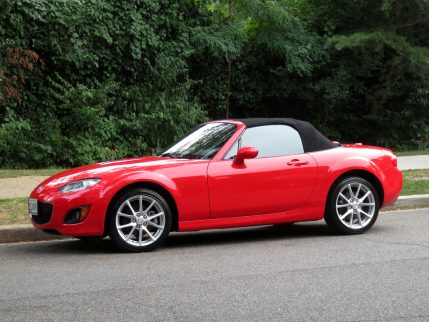Aside from safety and reliability, one of the most important factors car buyers look for in their next vehicle is fuel efficiency. In this blog post, we’ll help you find the most efficient vehicles by class.
What Is Fuel Efficiency?
Fuel efficiency, also referred to as fuel economy, is a measurement of how many litres of gas a car needs to travel 100 km (L/100km). A highly efficient car will have a rating of 6L/100 km or less. Depending on the vehicle and how it’s used, fuel efficiency can range dramatically. This rating is useful for budgeting your gas costs and being aware of the impact your driving habits have on the environment.
In Canada, new cars have an EnerGuide label on them that shows their fuel efficiency rating. For used cars, you can ask the dealer about fuel efficiency or find the model’s original rating online. Remember that fuel efficiency depletes over time, so an older vehicle may not be able to keep up with the rating it was originally assigned.
Because gas prices are expected to continue climbing, finding a fuel-efficient vehicle will be more important than ever to many drivers. To help begin your search, we’ve compiled a list, adapted from the Canadian Kelley Blue Book, of the top five most fuel-efficient vehicles within each of the following vehicle classes over the past five years.
Most Fuel-Efficient Vehicles by Vehicle Class
Convertible
- 2021 & 2022 Mazda MX-5 Miata
- 2020 Fiat 124 Spider
- 2018 & 2019 MINI Convertible
Coupe
- 2022 MINI Hardtop 2 Door
- 2021 Hyundai Veloster
- 2018-2020 Honda Civic
Hatchback
- 2018-2022 Hyundai Ioniq Hybrid
Sedan
- 2018-2022 Hyundai Ioniq Hybrid
SUV
- 2019-2022 Toyota RAV4 Hybrid
- 2018 Nissan Kicks
Truck
- 2019 & 2022 Ford Ranger SuperCab
- 2021 GMC Sierra 1500 Crew Cab
- 2020 Ford Ranger SuperCrew
- 2018 Ford F150 Regular Cab
Van
- 2021 & 2022 Toyota Sienna
- 2018-2020 Chrysler Pacifica Hybrid
Wagon
- 2018, 2021 & 2022 Kia Niro
- 2019 & 2020 Kia Niro Plug-In Hybrid[LS1]
Other Tips
Try not to be too attached to any particular class or style when you search for a new car. By staying optimistic and weighing all your options with a level head, you’ll maximize your chances of finding the most fuel-efficient vehicle for your needs.
Here are some other things to consider when browsing for a fuel-efficient vehicle.
Size Down
Generally, the smaller and lighter the vehicle, the less fuel it’ll consume. Look for the smallest vehicle that is suitable for your lifestyle.
Look for Certain Features
Certain features can improve a vehicle’s fuel efficiency, such as cruise control, turbochargers, block heaters, and aluminum wheels. At the same time, avoid unnecessary features or using certain features, like A/C with the windows down, that use up more fuel.
Go Electric
Many drivers try to improve their fuel efficiency by turning to electric vehicles. On average, EVs convert 76 percent of energy into vehicle movement while gas-powered cars convert only 16 percent. The trade-offs are that EVs are typically more expensive upfront and some people worry about range anxiety—the fear of running out of energy/fuel while on the road. As the EV market continues to grow, however, this fear is becoming more avoidable.
Gas Prices Are Only One Factor
Picking a fuel-efficient vehicle has been important to many drivers for a long time, often in the name of reducing gas consumption and therefore helping the environment. With gas prices soaring, finding a fuel-efficient vehicle that’s suited to your lifestyle is a great way to manage your auto expenses. Whatever vehicle you choose, the best way to conserve your fuel in the long run is to drive efficiently. You can also track your car’s efficiency yourself to see if your rating improves over time.


